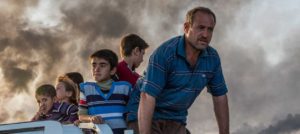Twenty refugees displaced every minute – UN report
The global refugee crisis continues to escalate despite peace agreements and a slow-down in the conflict in Syria and Iraq, a new report says.
The number of displaced people across the world has risen yet again and now 65.6 million people had to leave their homes because of violence and persecution, according to the UN refugee agency’s annual Global Trends Report.
The displacement figure is up from 65.3 million in 2015, and 59.5 million in 2014, and amounts to 20 people being displaced every minute of the day.
The growth was concentrated between 2012 and 2015, driven mainly by the Syrian conflict along with other conflicts in the region such as in Iraq and Yemen, as well as in sub-Saharan Africa including Burundi, the Central African Republic, the Democratic Republic of the Congo, South Sudan, and Sudan, the UNHCR-commissioned report says.
“By any measure this is an unacceptable number, and it speaks louder than ever to the need for solidarity and common purpose in preventing and resolving crises, and ensuring together that the world’s refugees, internally displaced and asylum seekers are properly protected and cared for while solutions are pursued,” said UN High Commissioner for Refugees Filippo Grandi.
 The report says Syria’s civil war is still the largest source of refugees (5.5 million in 2016), but the turmoil in South Sudan was newest largest factor, uprooting 1.87 million people to date.
The report says Syria’s civil war is still the largest source of refugees (5.5 million in 2016), but the turmoil in South Sudan was newest largest factor, uprooting 1.87 million people to date.
After Syria, Colombia was the second largest source of people forcibly displaced.
Despite a peace deal signed in November between the government and FARC rebels, fighting has continued among other armed groups, along with child soldier recruitment and gender-based violence, forcing tens of thousands of people to seek safety elsewhere.
Thirty-seven countries have taken in refugees, and most refugees (84 percent) were in developing nations, because they tend to be closest to areas of conflict.
Turkey hosts the most refugees at 2.9 million while Lebanon still has the highest number per capita with one in six people a refugee.
One positive sign was that more refugees returned home than in years past with 552,200 people making the journey back, the report said.
It says one in 113 people worldwide is displaced, with a record 65.6 million people forcibly displaced at the end of 2016, which is more than the population of Britain.
The figure includes 22.5 million refugees, 40.3 million uprooted within their countries and 2.8 million asylum seekers.
One person became displaced every three seconds in 2016. More than half of refugees globally come from Syria, Afghanistan and South Sudan, which is the fastest growing refugee population spurred by the crisis.
The report says nearly two-thirds of Syrians have been forced to flee their homes
There were two million new asylum claims in 2016, with Germany receiving the highest number, followed by the United States, Italy and Turkey.
Unaccompanied or separated children, mainly Afghans and Syrians, lodged some 75,000 applications in 70 countries in 2016. But the report warns this may be an underestimate as the data is incomplete. Children under 18 make up just over half the refugee population.
Thirty-seven countries accepted resettlement of 189,300 refugees, whilst 552,200 refugees returned to their countries of origin, more than a double from the previous year.
At least 10 million people are estimated to be stateless.
The report says South Sudan is the fastest growing refugee crisis. The large number of infants, children, and pregnant women among the South Sudanese refugees made the humanitarian response particularly challenging.
South Sudan and the neighbouring countries are among the poorest and least developed countries in the world, with limited resources to deal with the needs and challenges associated with hosting displaced people, the report says.
“Although most refugees remained close to home, some moved further afield, resulting in an increase in refugee and asylum-seeker populations in some European States. In Germany, this population rose to 1.3 million people by the end of 2016, while in Sweden it reached 313,300,” the report said.
Around half of the 2016 refugee population were children. Without the protection of family, unaccompanied and separated children are particularly at risk of exploitation and abuse, it said.
The report also found record numbers of people seeking refuge in the face of multiple crises.
Laurie Nowell
AMES Australia Senior Journalist












